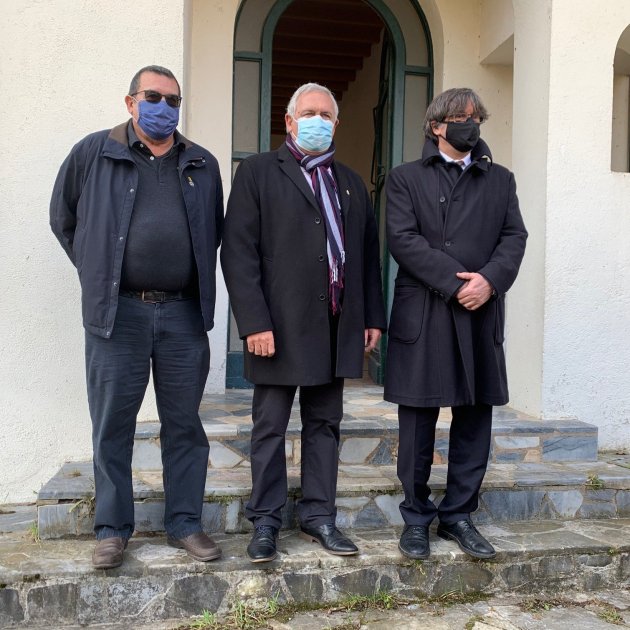Today, exiled Catalan president Carles Puigdemont has been in Northern Catalonia - on the French side of the Pyrenean border. The reason for his visit: to pay homage to another president, Francesc Macià, at the Vil·la Denise, the Prats de Molló house from which he organized what was intended to be an armed uprising in Catalonia in 1926, during the first of Spain's 20th century dictatorships, that of Primo de Rivera. Puigdemont stressed the symbolic component of the visit. "We're still here. They haven't beaten us. They haven't broken us. Many things could happen but we'll still be here," he said in front of a monument in honour to Macià, who became Catalonia's 122nd president five years after the events of Prats de Molló.
After recalling Catalonia's current political prisoners, exiles and all those now suffering persecution by the Spanish state, Carles Puigdemont referred to the trial which Macià was given in France, as a consequence of being arrested by French authorities before his planned action against the Spanish dictatorship was able to begin. The court case was, according to Puigdemont, the first major act of modern internationalization of the Catalan cause. “And so we go on,” he added.
The visit was organized on the occasion of the recovery of the Vil·la Denise, which had been on sale for several years and has now been acquired by a group of Catalans in order to convert it into a centre for historical memory.
Puigdemont visited the house, where Macià lived during the days when the armed incursion into Catalonia was being prepared, and saw the room where his staff met. Macià was arrested by the French gendarmerie on November 4th, 1926 in his bedroom.
Puigdemont takes in the view from one of the rooms in Vil·la Denise / ML
In a brief session with the press, Puigdemont refused to respond in detail on current political news, arguing that the purpose of the visit was to show gratitude for the recovery of the building and the preservation of its historical heritage.
The "red thread" of struggle
However, he did talk about the historical parallels with the events that took place in Prats de Molló. "We have come a long way and we want to go a long way. In order to do so we must know where we come from and maintain maximum fidelity to the struggle for freedom, this red thread of struggle," he asserted.
The mayor of Prats de Molló, Claude Ferrer, and businessperson Jaume Aragall, president of the chamber of commerce of the Vallès Oriental, who financed the purchase of the house, greeted Puigdemont on his arrival. They were also accompanied by the director of Puigdemont's ex-presidential office, the historian Josep Lluís Alay, who launched the initiative to preserve the house; the president of the Barcelona chamber of commerce and JxCat candidate, Joan Canadell; and parliamentary deputy speaker Josep Costa.
A French gendarme maintained a security presence during Puigdemont's visit to Vil·la Denise / ML
Puigdemont, who said he was excited to set foot on Catalan soil, very close to the southern Catalonia town of Camprodon, emphasized that all the projects that Catalan nationalism has undertaken since Francesc Macià "have aimed to bequeath to future generations a country with the possibility of democracy and freedom, essential elements for the well-being and prosperity of the people". “And thus, history will repeat itself until we achieve that full freedom,” he warned.
For now, he says that "a not inconsiderable" amount of progress has been made, but "there is still a long way to go" which can only be travelled in the same way as has been done so far.
"Els Fets de Prats de Molló"
At Vil·la Denise, in the autumn of 1926, Francesc Macià - then, an army colonel in exile - and the leadership of the pro-independence party Estat Català prepared an invasion that was to set out from Northern Catalonia, entering the south via the Coll d'Ares and Sant Llorenç de Cerdans, to occupy Olot and proclaim the Catalan Republic there, and thus liberate it from the Spanish dictatorship of Primo de Rivera. But the mission eventually failed because a spy for Mussolini, Ricciotti Garibaldi, reported it to the Spanish authorities, and Macià and his group were arrested on November 4th, 1926, in what became known as Els Fets - The Events - of Prats de Molló.
The defendants were tried in Paris in a court case of significant international impact in which Macià declared himself to be solely responsible, in a statement based on the principles of independence, democracy and revolution. The Catalan colonel was sentenced to six months in prison. After serving his sentence, Macià went into exile again, this time in Belgium and Argentina, until 1931, when he returned to Catalonia and his party, the Catalan Republican Left (ERC), won a landslide victory in local elections - whereupon Macià proclaimed "the Catalan Republic, within an Iberian Confederation".
In the main image: Puigdemont, together with the mayor of Prats de Molló, Claude Ferrer, and the businessperson Jaume Aragall / ML
